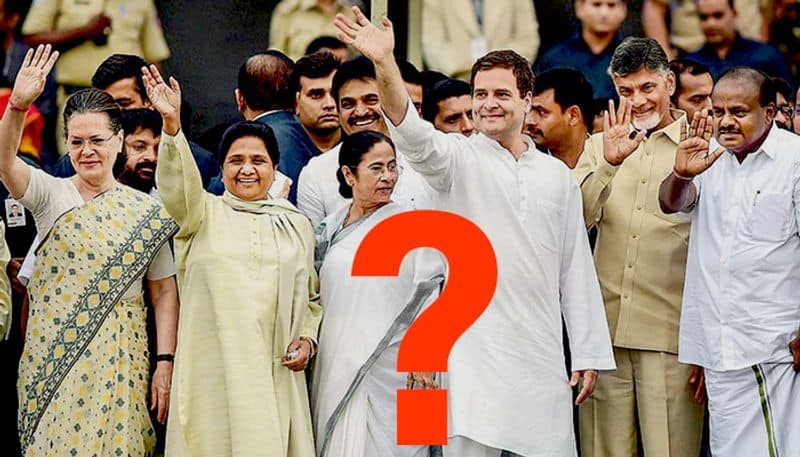With the Congress as the nucleus, this mythical entity was set to take on the NDA, which on the other hand, was quick to stitch smart alliances in various states. But now save for a few exceptions like in Tamil Nadu, the Mahagathbandhan practically looks a scrapped project and the Congress looks adrift like a buoy caught on a stormy night.
A couple of months back, the biggest word bandied around in political circles was Mahagathbandhan. But with hardly 20 days for the actual elections to kick off, the much talked of Mahagathbandhan remains stuck on paper. It has not crystalised into any meaningful form or acquired any decent structure.
"It already seems like an amorphous entity. No shape at all. All the hype now looks misplaced," says Charulatha Reddy, a political analyst in Hyderabad.
With the Congress as the nucleus, this mythical entity was set to take on the NDA, which on the other hand, was quick to stitch smart alliances in various states. But now save for a few exceptions like in Tamil Nadu, the Mahagathbandhan practically looks a scrapped project and the Congress looks adrift like a buoy caught on a stormy night.
So what happened?
Says Charulatha, "Lack of understanding and belief. It is Congress' Achilles heels. We saw that in 2014. We are witnessing a repeat in 2019, too. The Congress is never good at working with other partners. It has some attitudinal issues. This is a fact borne out historically."
Even in this era of coalitions, the Congress always contests in a large number of seats. It was 529 seats in 1996, 467 in 1998, 451 in 1999, 414 in 2004, 440 in 2009 and 464 in 2014. The Congress has so far declared candidates on 218 seats for this year polls.
But like most political stories, the Mahagathbandhan one too started promisingly. It began with the Andhra strongman and the Telugu Desam Party (TDP) storming the country, trying to whip up support among political parties for Rahul Gandhi's candidature as the Prime Minister.
It all seemed hunky-dory for the Congress, as a regional satrap, who had till recently been a sworn enemy of the party, was himself taking the initiative to whip up support for Rahul.
It all looked like a dream. Alas, it stayed a dream.
For, the TDP and the Congress were the first to have a fallout in Andhra Pradesh. They decided to go their own ways in the election in AP.
Elsewhere, in the electorally crucial state of Uttar Pradesh, Akhilesh Yadav and Mayawati were not even ready to talk business. They straightaway sidelined the Congress, and signed a pact between themselves.
"This was clearly the sign that things were not going the Congress way," says G Ashok, director of a political think-tank in Mumbai. "UP is the political bellwether. And Congress' inability there was immediately going to get telegraphed to other places."
The talks with Mamata Banerjee's TMC did not make any kind of headway. Nor did the chat with the Left for some kind of understanding proceed further.
The tie-up with the JD(S) in Karnataka is, at best, a tenuous one. The one with the RJD in Bihar seems okay, but looks highly shaky in Jharkhand. With the NCP in Maharashtra, things seem to hang on a knife's edge. It is a blow-hot-blow-cold situation with the AAP in Delhi. Only the link with the DMK in Tamil Nadu looks solid. But Congress's own house in that state is anything but in order, says Ashok.
Most political pundits put the blame at the doorsteps of the Congress and feel that its big-brotherly attitude is at the core of all the problems.
Adds a senior political writer in New Delhi, "The Congress is clearly overplaying its hand. The victories in Rajasthan and Madhya Pradesh late last year have pushed it into a strange complacency."
It thought it could get allies on its own terms. But the reality is different, he adds.
Congress party insiders feel that some opposition parties, fighting on their own in states, will join hands with it after the Lok Sabha polls if there is an opportunity to keep the BJP out of power.
This is their only hope now, says Charulatha wryly. "But the odds on it happening is pretty low," she adds.
Last Updated Mar 26, 2019, 5:40 PM IST











![Salman Khan sets stage on fire for Anant Ambani, Radhika Merchant pre-wedding festivities [WATCH] ATG](https://static-ai.asianetnews.com/images/01hr1hh8y86gvb4kbqgnyhc0w0/whatsapp-image-2024-03-03-at-12-24-37-pm_100x60xt.jpg)
![Pregnant Deepika Padukone dances with Ranveer Singh at Anant Ambani, Radhika Merchant pre-wedding bash [WATCH] ATG](https://static-ai.asianetnews.com/images/01hr1ffyd3nzqzgm6ba0k87vr8/whatsapp-image-2024-03-03-at-11-45-35-am_100x60xt.jpg)



